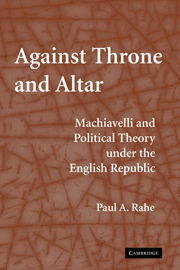Book contents
- Frontmatter
- Contents
- Acknowledgments
- Abbreviations and Brief Titles
- Introduction
- Prologue: Machiavelli in the English Revolution
- PART I MACHIAVELLI'S NEW REPUBLICANISM
- PART II REVOLUTIONARY ARISTOTELIANISM
- PART III MACHIAVELLIAN REPUBLICANISM ANGLICIZED
- PART IV THOMAS HOBBES AND THE NEW REPUBLICANISM
- 8 Thomas Hobbes's Republican Youth
- 9 The Making of a Modern Monarchist
- 10 The Very Model of a Modern Moralist
- 11 The Hobbesian Republicanism of James Harrington
- Epilogue
- Index
9 - The Making of a Modern Monarchist
Published online by Cambridge University Press: 21 July 2009
- Frontmatter
- Contents
- Acknowledgments
- Abbreviations and Brief Titles
- Introduction
- Prologue: Machiavelli in the English Revolution
- PART I MACHIAVELLI'S NEW REPUBLICANISM
- PART II REVOLUTIONARY ARISTOTELIANISM
- PART III MACHIAVELLIAN REPUBLICANISM ANGLICIZED
- PART IV THOMAS HOBBES AND THE NEW REPUBLICANISM
- 8 Thomas Hobbes's Republican Youth
- 9 The Making of a Modern Monarchist
- 10 The Very Model of a Modern Moralist
- 11 The Hobbesian Republicanism of James Harrington
- Epilogue
- Index
Summary
It would be tempting to suppose that in his youth Thomas Hobbes followed Niccolò Machiavelli slavishly, adopting his outlook in every particular. There is, however, no reason to suppose that the English writer ever shared the Florentine's liking for tumults. In his “Discourse upon the Beginning of Tacitus,” he displayed his signature distaste for disorder, remarking that “civill warre is the worst thing that can happen to a State.” Even more telling, in “A Discourse of Lawes,” the third of his three contributions to Horœ Subsecivœ and the one most indebted to Sir Francis Bacon, he described anarchy in terms foreshadowing his later description of the state of nature:
If men were not limited within certaine rules, such confusion would follow in government, that the differences of Right & wrong, Just and unlawfull, could never be distinguished; and that would cause such distraction in the people, & give so great an overthrow to conversation, and commerce amongst men, that all right would be perverted by power, and all honestie swayed by greatnesse: so that the equall administration of Justice, is the true knot that binds us to unity and peace amongst ourselves, and disperseth all such violent and unlawfull courses, as otherwise libertie would insinuate, preserving every man in his right, and preventing others, who if they thought their actions might passe with impunitie, would not measure their courses, by the rule of Aequum and Iustum, but by the square of their owne benefit, and affections: & so not being circumscribed within reasonable bounds, their reason becomes invisible; whereas when they finde that Justice has a Predominant power, they are deterred from proceeding in those acts, that otherwise their owne wils, and inclination would give them leave to effect.
- Type
- Chapter
- Information
- Against Throne and AltarMachiavelli and Political Theory Under the English Republic, pp. 273 - 290Publisher: Cambridge University PressPrint publication year: 2008



